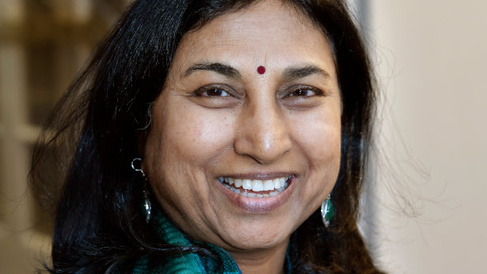
Professor Bina Agarwal, Professor of Development Economics and Environment at the GDI, University of Manchester gave a public talk on 'Progressive laws, Regressive practice? Gender, land and productivity in India' on Tuesday 22 November at theAlison Richard Building. The event was co-hosted by the Centre for Gender Studies, the Centre of South Asian Studies and the Centre for History and Economics and was followed by a Q&A and drinks reception. We would like to extend our thanks to Professor Agarwal and all contributors.
A recording of the talk can be accessed here
Since Independence, India’s inheritance laws have moved towards substantial gender equality. But how far has equality permeated practice? Although women are major contributors as farmers, how many own agricultural land? And in what capacity do they own it – as daughters or elderly widows? Equally, how do female owners perform in terms of farm productivity relative to male owners? These questions have been little addressed in the Indian context, especially due to data scarcity. This presentation, based on two recent papers, provides answers. Using a unique longitudinal dataset, the research assesses inter-gender (male-female) gaps in land ownership through multiple indicators, over 2009–2014, across nine states. It also analyses intra-gender gaps between women, examining if the legal strengthening of daughters’ rights has overcome the historically embedded legitimacy of widows’ claims? Finally, it compares female and male owners in terms of their land use and productivity.
Bina Agarwal was the Diane Middlebrook and Carl Djerassi Visiting Professor at the Centre for Gender Studies in Michaelmas 2018 and is currently visiting the Centre for History and Economics, University of Cambridge. She has been President of the International Society for Ecological Economics, President of the International Association for Feminist Economics, and Vice President of the International Economic Association.
Agarwal’s interdisciplinary research covers diverse topics, including property and land rights, technological change, environmental governance, bargaining and gender relations, law, and poverty, analysed from a political economy and gender perspective. Her 13 books include the prize-winning, A Field of One’s Own (Cambridge University Press, 1994); Gender and Green Governance (Oxford University Press, 2010); and Gender Challenges (OUP, 2016), a three volume compendium of her selected papers. She has garnered many awards, including a Padma Shri in 2008 from India’s President; the Leontief Prize 2010 ‘for advancing the frontiers of economic thought’; the Louis Malassis International Scientist Prize 2017; and the International Balzan Prize 2017. She is now writing a book on Group farming in Asia and Europe. See also: www.binaagarwal.com
